Ethical and Legal Perspectives on Medical Assistance in Dying Essay
VerifiedAdded on 2022/08/25
|6
|1572
|29
Essay
AI Summary
This essay delves into the multifaceted ethical and legal considerations surrounding Medical Assistance in Dying (MAiD) within the healthcare framework. It examines the arguments for and against MAiD, emphasizing patient autonomy and the right to make informed decisions, particularly in cases of terminal illness and unbearable suffering. The essay explores the bioethical principle of beneficence in the context of MAiD and considers counterarguments, such as the potential for effective pain and palliative care interventions. It concludes that, after careful consideration of patient circumstances, disease progression, and ethical standards, MAiD should be permitted within healthcare. The essay references relevant literature, providing a comprehensive analysis of this complex issue.
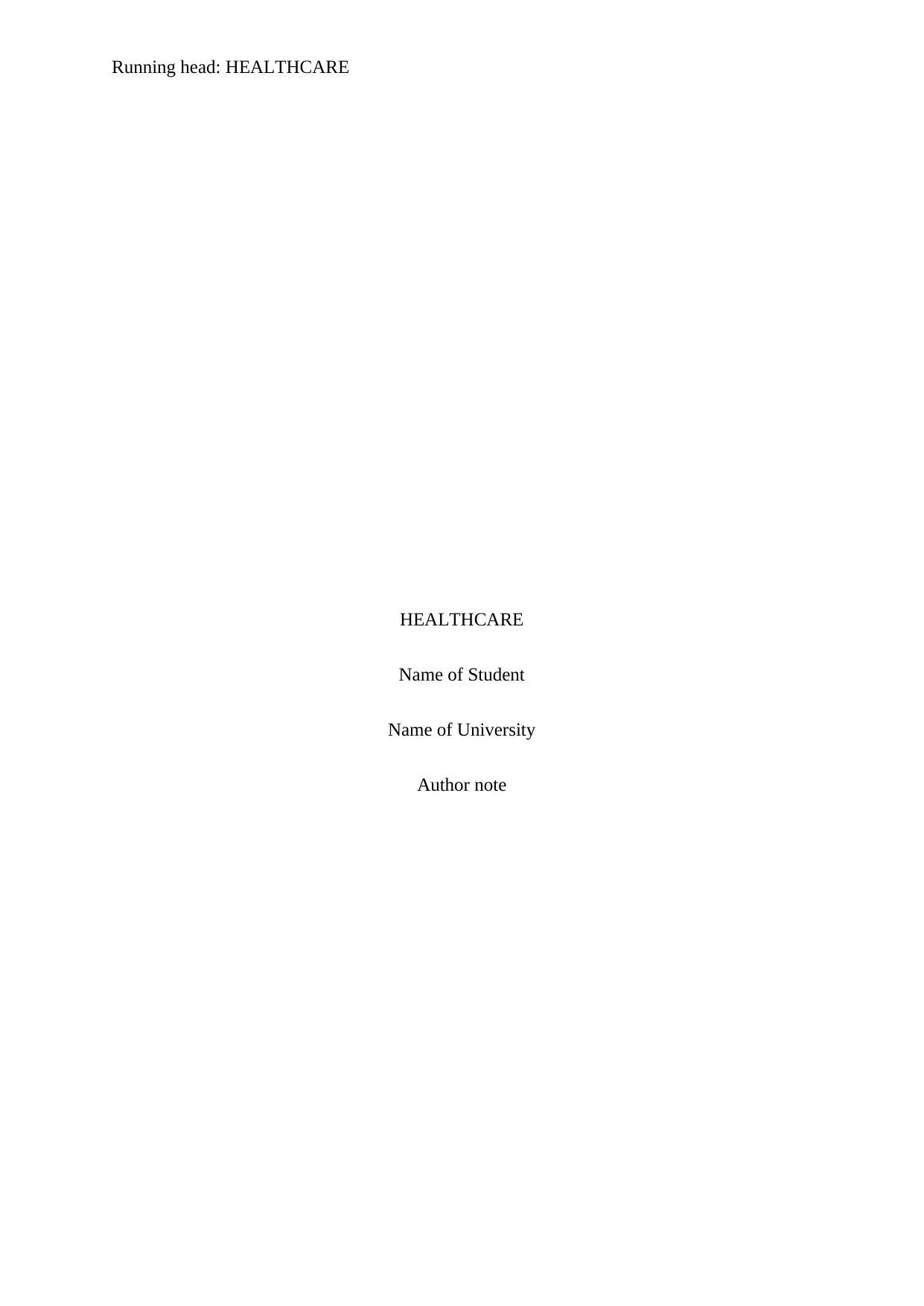
Running head: HEALTHCARE
HEALTHCARE
Name of Student
Name of University
Author note
HEALTHCARE
Name of Student
Name of University
Author note
Paraphrase This Document
Need a fresh take? Get an instant paraphrase of this document with our AI Paraphraser
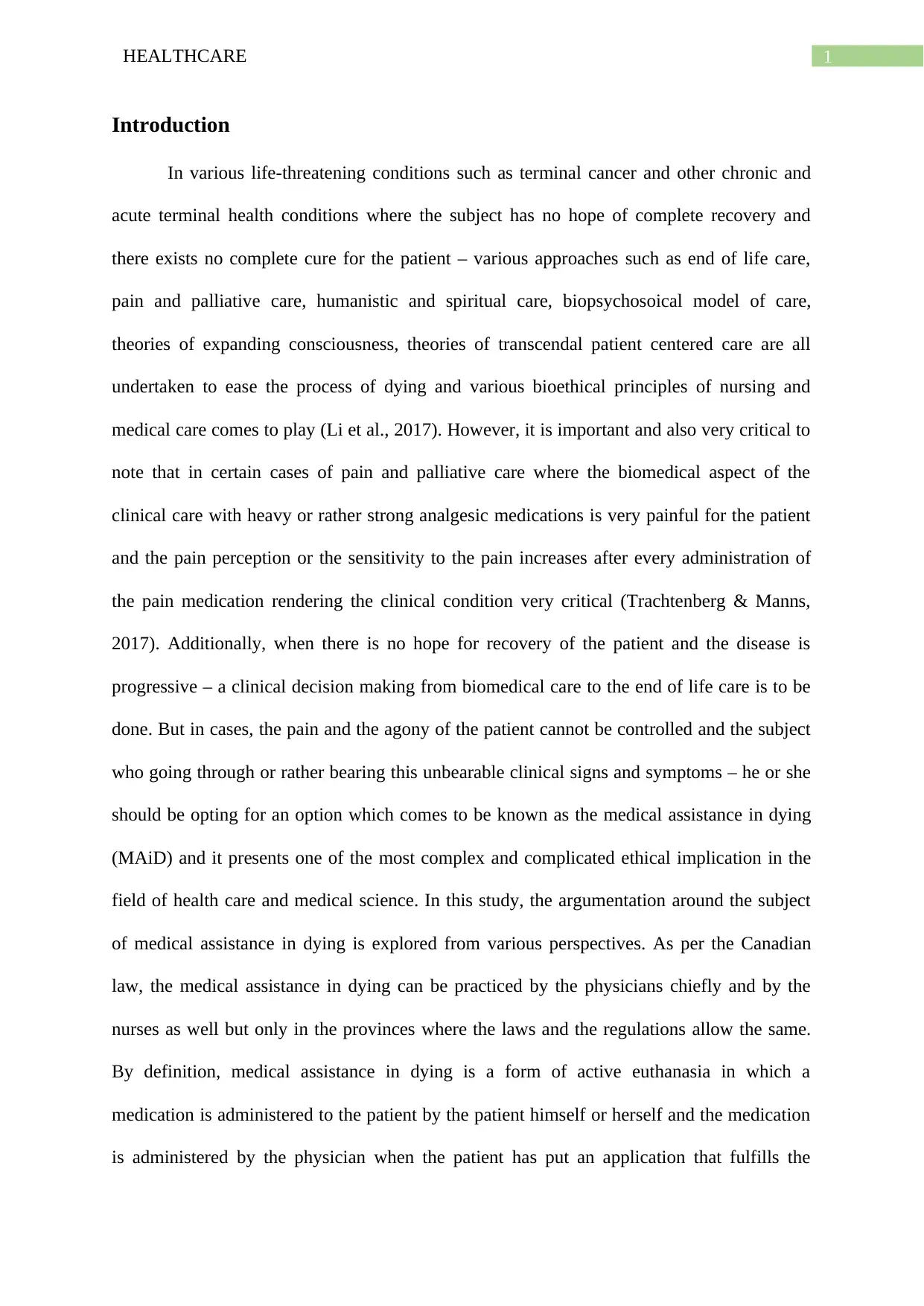
1HEALTHCARE
Introduction
In various life-threatening conditions such as terminal cancer and other chronic and
acute terminal health conditions where the subject has no hope of complete recovery and
there exists no complete cure for the patient – various approaches such as end of life care,
pain and palliative care, humanistic and spiritual care, biopsychosoical model of care,
theories of expanding consciousness, theories of transcendal patient centered care are all
undertaken to ease the process of dying and various bioethical principles of nursing and
medical care comes to play (Li et al., 2017). However, it is important and also very critical to
note that in certain cases of pain and palliative care where the biomedical aspect of the
clinical care with heavy or rather strong analgesic medications is very painful for the patient
and the pain perception or the sensitivity to the pain increases after every administration of
the pain medication rendering the clinical condition very critical (Trachtenberg & Manns,
2017). Additionally, when there is no hope for recovery of the patient and the disease is
progressive – a clinical decision making from biomedical care to the end of life care is to be
done. But in cases, the pain and the agony of the patient cannot be controlled and the subject
who going through or rather bearing this unbearable clinical signs and symptoms – he or she
should be opting for an option which comes to be known as the medical assistance in dying
(MAiD) and it presents one of the most complex and complicated ethical implication in the
field of health care and medical science. In this study, the argumentation around the subject
of medical assistance in dying is explored from various perspectives. As per the Canadian
law, the medical assistance in dying can be practiced by the physicians chiefly and by the
nurses as well but only in the provinces where the laws and the regulations allow the same.
By definition, medical assistance in dying is a form of active euthanasia in which a
medication is administered to the patient by the patient himself or herself and the medication
is administered by the physician when the patient has put an application that fulfills the
Introduction
In various life-threatening conditions such as terminal cancer and other chronic and
acute terminal health conditions where the subject has no hope of complete recovery and
there exists no complete cure for the patient – various approaches such as end of life care,
pain and palliative care, humanistic and spiritual care, biopsychosoical model of care,
theories of expanding consciousness, theories of transcendal patient centered care are all
undertaken to ease the process of dying and various bioethical principles of nursing and
medical care comes to play (Li et al., 2017). However, it is important and also very critical to
note that in certain cases of pain and palliative care where the biomedical aspect of the
clinical care with heavy or rather strong analgesic medications is very painful for the patient
and the pain perception or the sensitivity to the pain increases after every administration of
the pain medication rendering the clinical condition very critical (Trachtenberg & Manns,
2017). Additionally, when there is no hope for recovery of the patient and the disease is
progressive – a clinical decision making from biomedical care to the end of life care is to be
done. But in cases, the pain and the agony of the patient cannot be controlled and the subject
who going through or rather bearing this unbearable clinical signs and symptoms – he or she
should be opting for an option which comes to be known as the medical assistance in dying
(MAiD) and it presents one of the most complex and complicated ethical implication in the
field of health care and medical science. In this study, the argumentation around the subject
of medical assistance in dying is explored from various perspectives. As per the Canadian
law, the medical assistance in dying can be practiced by the physicians chiefly and by the
nurses as well but only in the provinces where the laws and the regulations allow the same.
By definition, medical assistance in dying is a form of active euthanasia in which a
medication is administered to the patient by the patient himself or herself and the medication
is administered by the physician when the patient has put an application that fulfills the
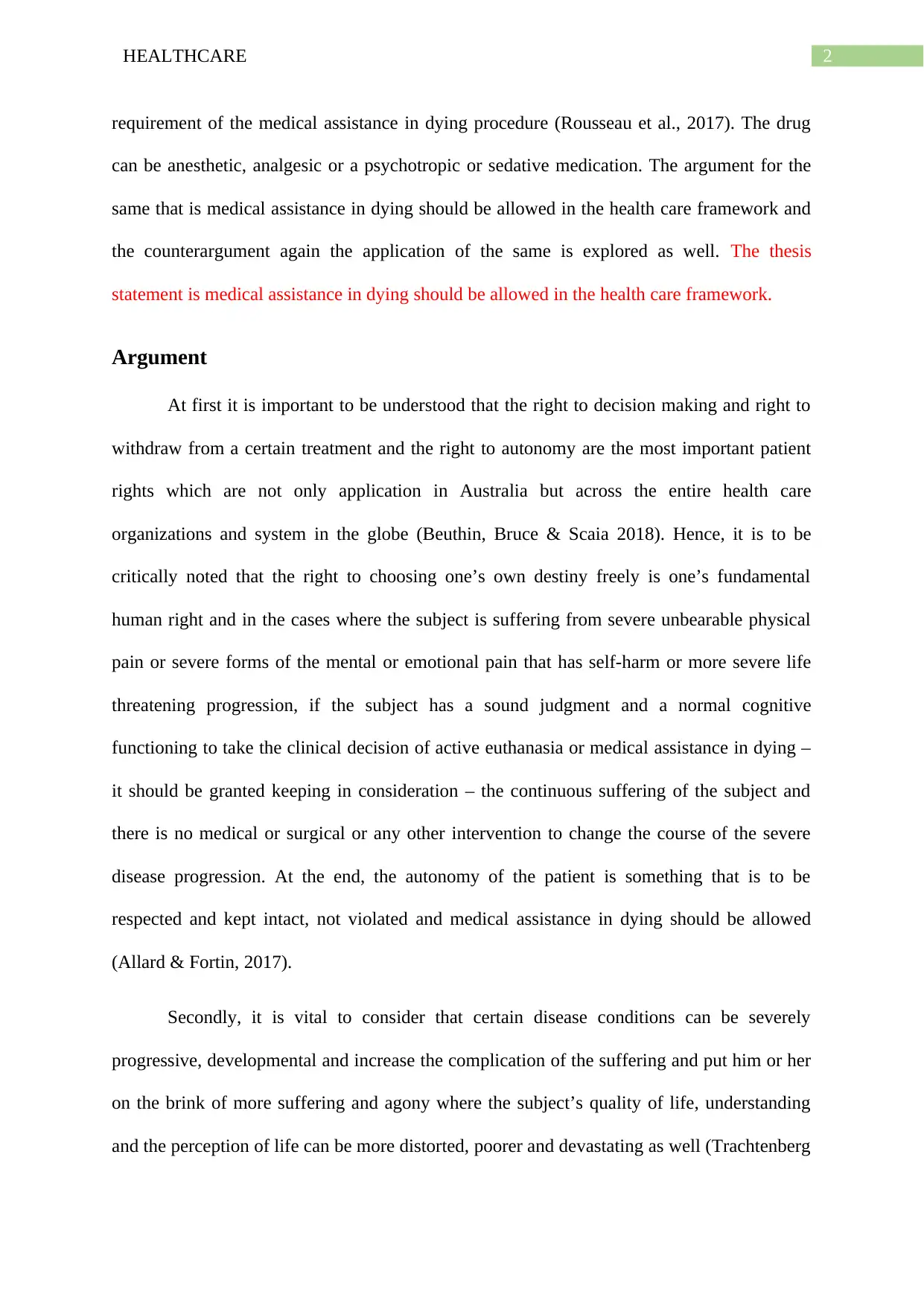
2HEALTHCARE
requirement of the medical assistance in dying procedure (Rousseau et al., 2017). The drug
can be anesthetic, analgesic or a psychotropic or sedative medication. The argument for the
same that is medical assistance in dying should be allowed in the health care framework and
the counterargument again the application of the same is explored as well. The thesis
statement is medical assistance in dying should be allowed in the health care framework.
Argument
At first it is important to be understood that the right to decision making and right to
withdraw from a certain treatment and the right to autonomy are the most important patient
rights which are not only application in Australia but across the entire health care
organizations and system in the globe (Beuthin, Bruce & Scaia 2018). Hence, it is to be
critically noted that the right to choosing one’s own destiny freely is one’s fundamental
human right and in the cases where the subject is suffering from severe unbearable physical
pain or severe forms of the mental or emotional pain that has self-harm or more severe life
threatening progression, if the subject has a sound judgment and a normal cognitive
functioning to take the clinical decision of active euthanasia or medical assistance in dying –
it should be granted keeping in consideration – the continuous suffering of the subject and
there is no medical or surgical or any other intervention to change the course of the severe
disease progression. At the end, the autonomy of the patient is something that is to be
respected and kept intact, not violated and medical assistance in dying should be allowed
(Allard & Fortin, 2017).
Secondly, it is vital to consider that certain disease conditions can be severely
progressive, developmental and increase the complication of the suffering and put him or her
on the brink of more suffering and agony where the subject’s quality of life, understanding
and the perception of life can be more distorted, poorer and devastating as well (Trachtenberg
requirement of the medical assistance in dying procedure (Rousseau et al., 2017). The drug
can be anesthetic, analgesic or a psychotropic or sedative medication. The argument for the
same that is medical assistance in dying should be allowed in the health care framework and
the counterargument again the application of the same is explored as well. The thesis
statement is medical assistance in dying should be allowed in the health care framework.
Argument
At first it is important to be understood that the right to decision making and right to
withdraw from a certain treatment and the right to autonomy are the most important patient
rights which are not only application in Australia but across the entire health care
organizations and system in the globe (Beuthin, Bruce & Scaia 2018). Hence, it is to be
critically noted that the right to choosing one’s own destiny freely is one’s fundamental
human right and in the cases where the subject is suffering from severe unbearable physical
pain or severe forms of the mental or emotional pain that has self-harm or more severe life
threatening progression, if the subject has a sound judgment and a normal cognitive
functioning to take the clinical decision of active euthanasia or medical assistance in dying –
it should be granted keeping in consideration – the continuous suffering of the subject and
there is no medical or surgical or any other intervention to change the course of the severe
disease progression. At the end, the autonomy of the patient is something that is to be
respected and kept intact, not violated and medical assistance in dying should be allowed
(Allard & Fortin, 2017).
Secondly, it is vital to consider that certain disease conditions can be severely
progressive, developmental and increase the complication of the suffering and put him or her
on the brink of more suffering and agony where the subject’s quality of life, understanding
and the perception of life can be more distorted, poorer and devastating as well (Trachtenberg
⊘ This is a preview!⊘
Do you want full access?
Subscribe today to unlock all pages.

Trusted by 1+ million students worldwide
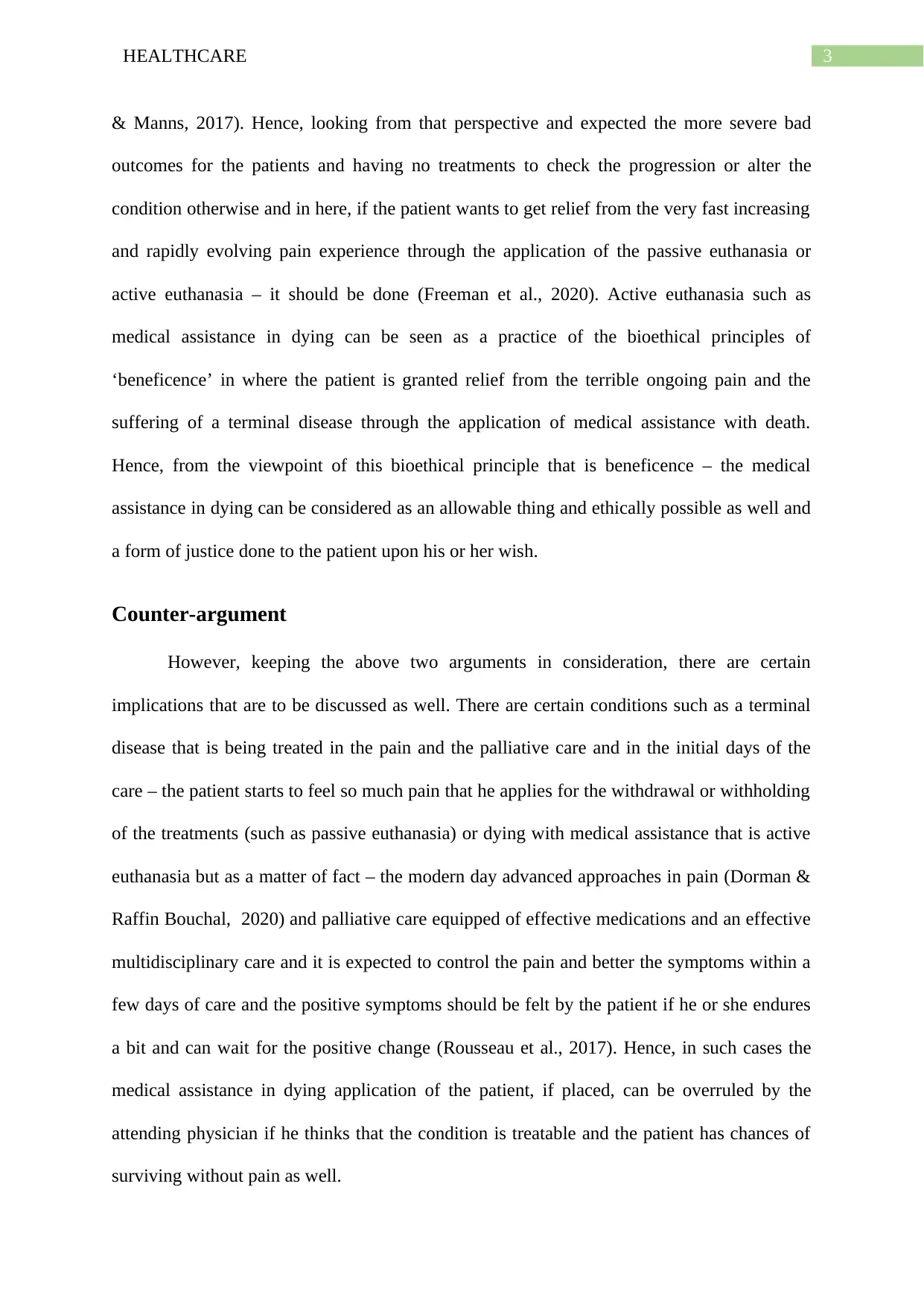
3HEALTHCARE
& Manns, 2017). Hence, looking from that perspective and expected the more severe bad
outcomes for the patients and having no treatments to check the progression or alter the
condition otherwise and in here, if the patient wants to get relief from the very fast increasing
and rapidly evolving pain experience through the application of the passive euthanasia or
active euthanasia – it should be done (Freeman et al., 2020). Active euthanasia such as
medical assistance in dying can be seen as a practice of the bioethical principles of
‘beneficence’ in where the patient is granted relief from the terrible ongoing pain and the
suffering of a terminal disease through the application of medical assistance with death.
Hence, from the viewpoint of this bioethical principle that is beneficence – the medical
assistance in dying can be considered as an allowable thing and ethically possible as well and
a form of justice done to the patient upon his or her wish.
Counter-argument
However, keeping the above two arguments in consideration, there are certain
implications that are to be discussed as well. There are certain conditions such as a terminal
disease that is being treated in the pain and the palliative care and in the initial days of the
care – the patient starts to feel so much pain that he applies for the withdrawal or withholding
of the treatments (such as passive euthanasia) or dying with medical assistance that is active
euthanasia but as a matter of fact – the modern day advanced approaches in pain (Dorman &
Raffin Bouchal, 2020) and palliative care equipped of effective medications and an effective
multidisciplinary care and it is expected to control the pain and better the symptoms within a
few days of care and the positive symptoms should be felt by the patient if he or she endures
a bit and can wait for the positive change (Rousseau et al., 2017). Hence, in such cases the
medical assistance in dying application of the patient, if placed, can be overruled by the
attending physician if he thinks that the condition is treatable and the patient has chances of
surviving without pain as well.
& Manns, 2017). Hence, looking from that perspective and expected the more severe bad
outcomes for the patients and having no treatments to check the progression or alter the
condition otherwise and in here, if the patient wants to get relief from the very fast increasing
and rapidly evolving pain experience through the application of the passive euthanasia or
active euthanasia – it should be done (Freeman et al., 2020). Active euthanasia such as
medical assistance in dying can be seen as a practice of the bioethical principles of
‘beneficence’ in where the patient is granted relief from the terrible ongoing pain and the
suffering of a terminal disease through the application of medical assistance with death.
Hence, from the viewpoint of this bioethical principle that is beneficence – the medical
assistance in dying can be considered as an allowable thing and ethically possible as well and
a form of justice done to the patient upon his or her wish.
Counter-argument
However, keeping the above two arguments in consideration, there are certain
implications that are to be discussed as well. There are certain conditions such as a terminal
disease that is being treated in the pain and the palliative care and in the initial days of the
care – the patient starts to feel so much pain that he applies for the withdrawal or withholding
of the treatments (such as passive euthanasia) or dying with medical assistance that is active
euthanasia but as a matter of fact – the modern day advanced approaches in pain (Dorman &
Raffin Bouchal, 2020) and palliative care equipped of effective medications and an effective
multidisciplinary care and it is expected to control the pain and better the symptoms within a
few days of care and the positive symptoms should be felt by the patient if he or she endures
a bit and can wait for the positive change (Rousseau et al., 2017). Hence, in such cases the
medical assistance in dying application of the patient, if placed, can be overruled by the
attending physician if he thinks that the condition is treatable and the patient has chances of
surviving without pain as well.
Paraphrase This Document
Need a fresh take? Get an instant paraphrase of this document with our AI Paraphraser
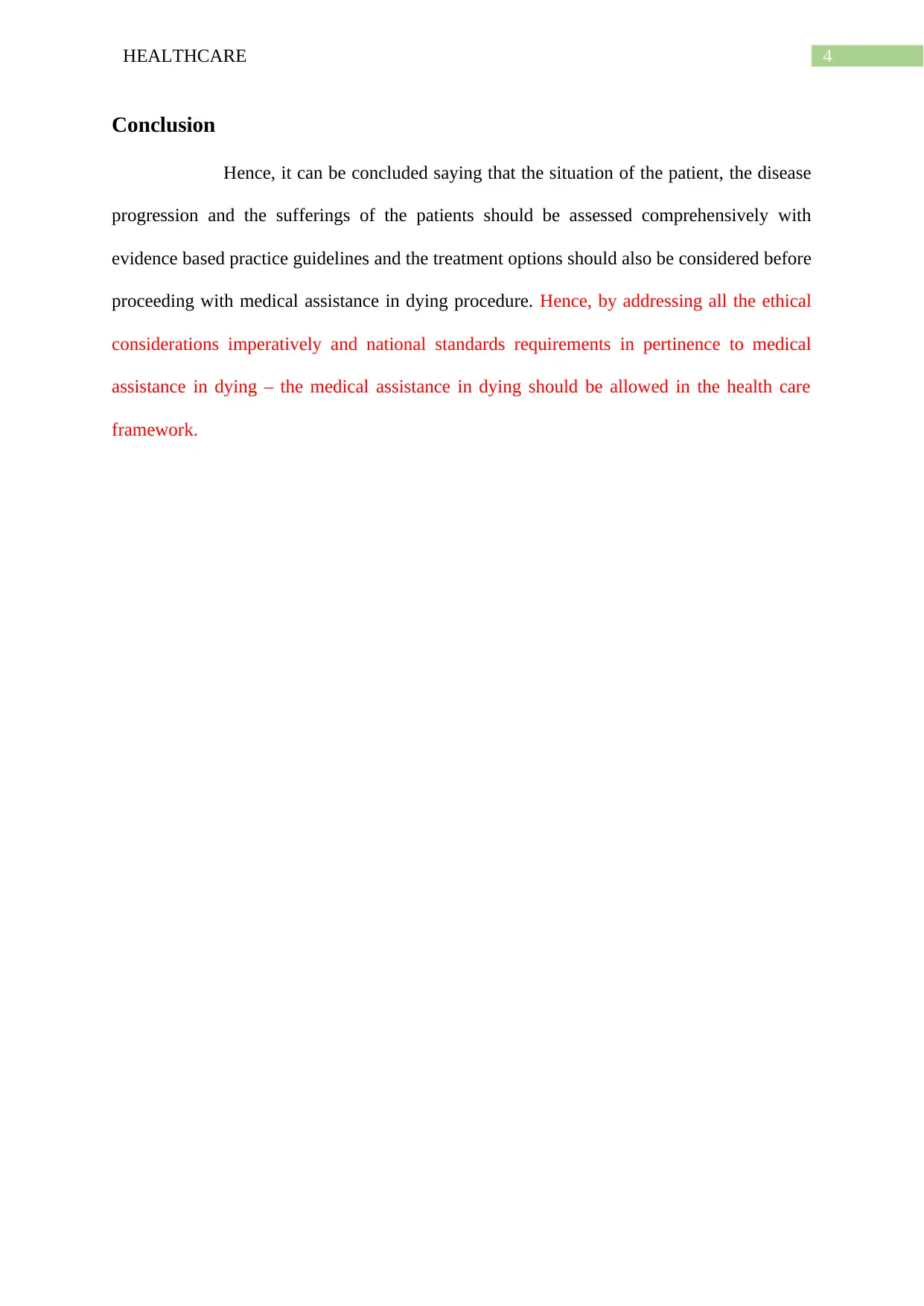
4HEALTHCARE
Conclusion
Hence, it can be concluded saying that the situation of the patient, the disease
progression and the sufferings of the patients should be assessed comprehensively with
evidence based practice guidelines and the treatment options should also be considered before
proceeding with medical assistance in dying procedure. Hence, by addressing all the ethical
considerations imperatively and national standards requirements in pertinence to medical
assistance in dying – the medical assistance in dying should be allowed in the health care
framework.
Conclusion
Hence, it can be concluded saying that the situation of the patient, the disease
progression and the sufferings of the patients should be assessed comprehensively with
evidence based practice guidelines and the treatment options should also be considered before
proceeding with medical assistance in dying procedure. Hence, by addressing all the ethical
considerations imperatively and national standards requirements in pertinence to medical
assistance in dying – the medical assistance in dying should be allowed in the health care
framework.
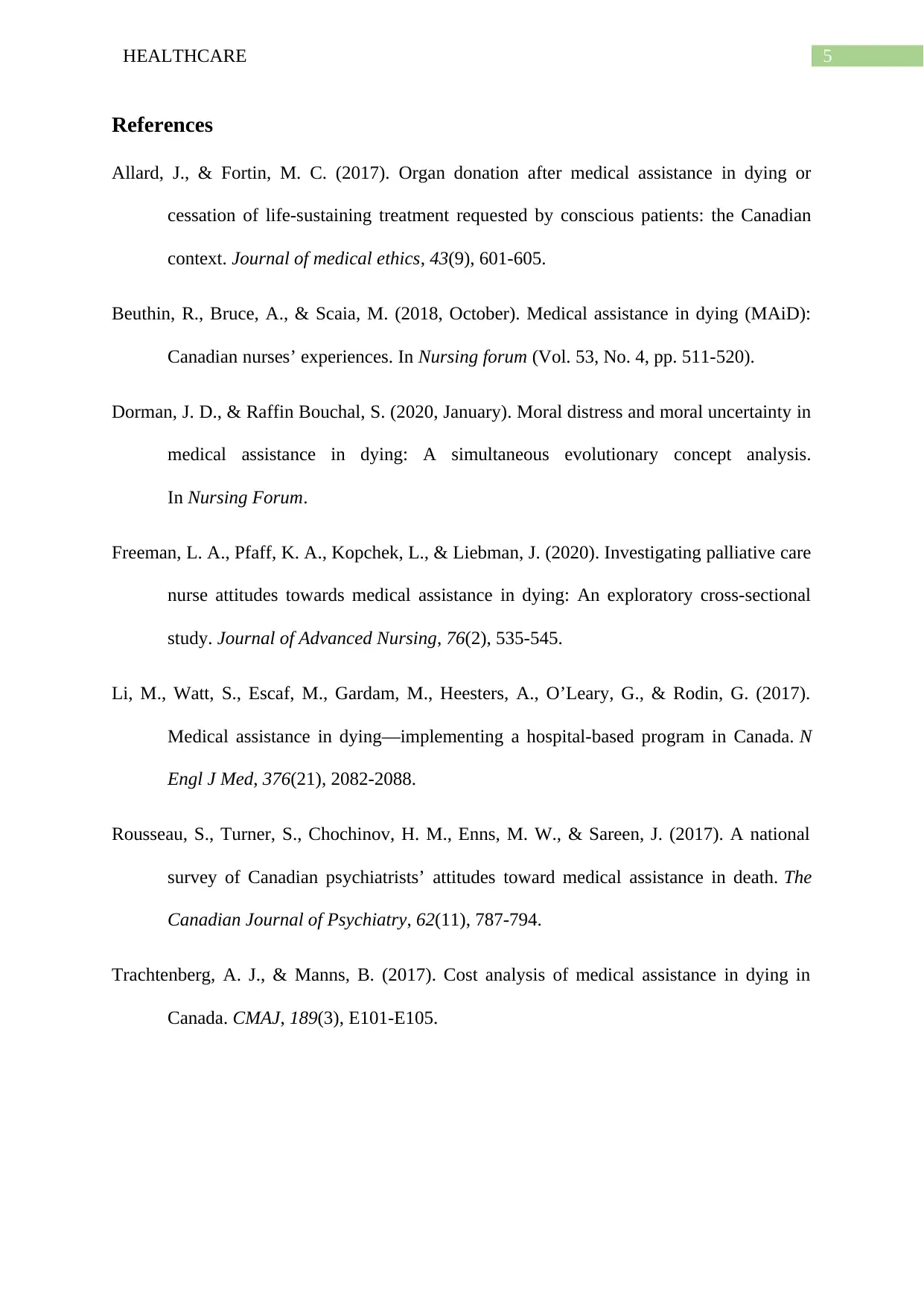
5HEALTHCARE
References
Allard, J., & Fortin, M. C. (2017). Organ donation after medical assistance in dying or
cessation of life-sustaining treatment requested by conscious patients: the Canadian
context. Journal of medical ethics, 43(9), 601-605.
Beuthin, R., Bruce, A., & Scaia, M. (2018, October). Medical assistance in dying (MAiD):
Canadian nurses’ experiences. In Nursing forum (Vol. 53, No. 4, pp. 511-520).
Dorman, J. D., & Raffin Bouchal, S. (2020, January). Moral distress and moral uncertainty in
medical assistance in dying: A simultaneous evolutionary concept analysis.
In Nursing Forum.
Freeman, L. A., Pfaff, K. A., Kopchek, L., & Liebman, J. (2020). Investigating palliative care
nurse attitudes towards medical assistance in dying: An exploratory cross‐sectional
study. Journal of Advanced Nursing, 76(2), 535-545.
Li, M., Watt, S., Escaf, M., Gardam, M., Heesters, A., O’Leary, G., & Rodin, G. (2017).
Medical assistance in dying—implementing a hospital-based program in Canada. N
Engl J Med, 376(21), 2082-2088.
Rousseau, S., Turner, S., Chochinov, H. M., Enns, M. W., & Sareen, J. (2017). A national
survey of Canadian psychiatrists’ attitudes toward medical assistance in death. The
Canadian Journal of Psychiatry, 62(11), 787-794.
Trachtenberg, A. J., & Manns, B. (2017). Cost analysis of medical assistance in dying in
Canada. CMAJ, 189(3), E101-E105.
References
Allard, J., & Fortin, M. C. (2017). Organ donation after medical assistance in dying or
cessation of life-sustaining treatment requested by conscious patients: the Canadian
context. Journal of medical ethics, 43(9), 601-605.
Beuthin, R., Bruce, A., & Scaia, M. (2018, October). Medical assistance in dying (MAiD):
Canadian nurses’ experiences. In Nursing forum (Vol. 53, No. 4, pp. 511-520).
Dorman, J. D., & Raffin Bouchal, S. (2020, January). Moral distress and moral uncertainty in
medical assistance in dying: A simultaneous evolutionary concept analysis.
In Nursing Forum.
Freeman, L. A., Pfaff, K. A., Kopchek, L., & Liebman, J. (2020). Investigating palliative care
nurse attitudes towards medical assistance in dying: An exploratory cross‐sectional
study. Journal of Advanced Nursing, 76(2), 535-545.
Li, M., Watt, S., Escaf, M., Gardam, M., Heesters, A., O’Leary, G., & Rodin, G. (2017).
Medical assistance in dying—implementing a hospital-based program in Canada. N
Engl J Med, 376(21), 2082-2088.
Rousseau, S., Turner, S., Chochinov, H. M., Enns, M. W., & Sareen, J. (2017). A national
survey of Canadian psychiatrists’ attitudes toward medical assistance in death. The
Canadian Journal of Psychiatry, 62(11), 787-794.
Trachtenberg, A. J., & Manns, B. (2017). Cost analysis of medical assistance in dying in
Canada. CMAJ, 189(3), E101-E105.
⊘ This is a preview!⊘
Do you want full access?
Subscribe today to unlock all pages.

Trusted by 1+ million students worldwide
1 out of 6
Related Documents
Your All-in-One AI-Powered Toolkit for Academic Success.
+13062052269
info@desklib.com
Available 24*7 on WhatsApp / Email
![[object Object]](/_next/static/media/star-bottom.7253800d.svg)
Unlock your academic potential
Copyright © 2020–2026 A2Z Services. All Rights Reserved. Developed and managed by ZUCOL.





